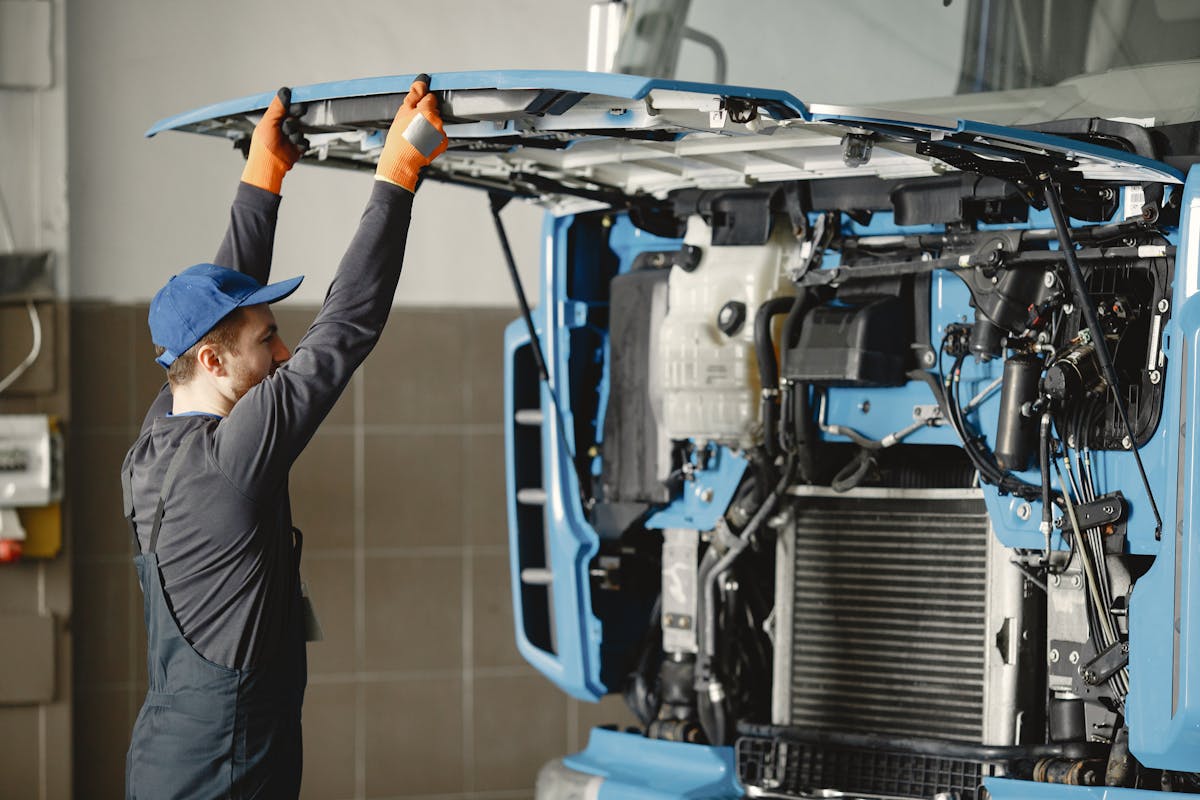DOT Inspection: FAQ
DOT inspections are essential for ensuring the safety and compliance of commercial vehicles on the road. This article answers the most frequently asked questions about DOT inspections. Whether you're a fleet owner, driver, or manager, this guide simplifies the DOT inspection process.

What is DOT Inspection?
DOT inspections, also known as Department of Transportation inspections, are thorough inspections of commercial vehicles to ensure they meet safety and regulatory requirements. Inspections cover various components and documentation for both the vehicle and the driver.
How Often Do DOT Inspections Happen?
For all operating commercial motor vehicles, DOT inspections are required every 12 months.
Law enforcement may conduct random inspections at any time, especially at roadside checkpoints or inspection stations.
Who is subject to DOT Inspections
Every 25,000 miles or annually, the following vehicles must be inspected:
- Commercial motor vehicles that weigh over 10,000 pounds - DOT inspections are required for CMVs with a gross vehicle weight rating (GVWR) or gross combination weight rating (GCWR) over 10,000 pounds. This includes a wide range of trucks and large vehicles used for commercial purposes.
- Vehicles Transporting More Than 16 Passengers (including the driver)
- Vehicles Transporting Hazardous Materials
- Passenger Buses
- School Buses
What is the DOT Looking For?
Specifically, a DOT inspector is looking for the following items:
Driver
- Driver Documents
- Driver’s License
- Medical Documents clearing you to driver
- Hours of Service (HOS) logs
- ELD
- Carrier ID and Status
- Record of Duty Status (ROS)
In addition to this, the inspector may ask for additional documents and check that the driver is not under the influence of drugs or alcohol.
Truck
- Tires
- Brakes
- Suspension
- Brake lights
- Turn signals
- Fuel systems
- Steering
- Windshield wipers
- More
Who Conducts DOT Inspections?
Annual inspections will most likely be conducted by DOT-certified inspectors. The State Troopers are also licensed to conduct DOT inspections. They may stop you for a surprise inspection while you're driving.
What are the six levels of truck inspections?
The six levels of truck inspections refer to the different levels of scrutiny and detail involved in roadside inspections conducted by enforcement officers, typically in collaboration with the Commercial Vehicle Safety Alliance (CVSA). These inspections are aimed at ensuring that commercial vehicles and drivers comply with safety regulations. Here's an overview of each level:
Level I: North American Standard Inspection (NAS)
- Purpose: Comprehensive inspection covering both the vehicle and driver.
- Vehicle Inspection: Brakes, fuel system, exhaust system, suspension, coupling devices, tires, wheels, lights, and more.
- Driver Inspection: Driver's license, medical examiner's certificate, hours of service (HOS) compliance, record of duty status (RODS), and more.
- Frequency: Most detailed and commonly conducted.
Level II: Walk-Around Driver/Vehicle Inspection
- Purpose: Similar to Level I but without a detailed examination of the braking system.
- Vehicle Inspection: Exterior components, such as lights, tires, brakes, coupling devices, and cargo securement.
Level III: Driver-Only Inspection
- Purpose: Focuses on the driver's credentials and documentation.
- Driver Inspection: Driver's license, HOS compliance, RODS, medical examiner's certificate, and other required documentation.
- Vehicle Inspection: Limited to a cursory check to ensure the vehicle's roadworthiness.
Level IV: Special Inspection
- Purpose: Inspection for a specific purpose, often involving a single component or system.
- Example: Emissions inspection or an examination of a specific safety or compliance aspect.
Level V: Vehicle-Only Inspection
- Purpose: Inspects specific vehicle components without assessing the driver.
- Vehicle Inspection: Brakes, lights, tires, coupling devices, and other mechanical components.
- Driver Inspection: Not included in Level V.
Level VI: Radioactive Materials Inspection
- Purpose: Specific to vehicles transporting radioactive materials.
- Inspection Focus: Ensures compliance with regulations governing the transportation of radioactive cargo.
- Frequency: Rare, given the specialized nature of the cargo.
What are the most common violations?
Common violations against drivers include:
- Logging violations
- No medical card, or it’s expired
- Invalid or expired license
- Not wearing a seat belt
- Exceeding HOS laws
Common violations against CMVs include:
- Inoperable lights
- Tire tread depth below 2/32 of an inch
- Oil, grease, transmission fluid or fuel leaks
- No current annual inspection on file
- Improperly loaded cargo
- Discharged or unsecured fire extinguisher
Tips on Passing a DOT Inspection
Preventive maintenance: Contact a maintenance technician on a regular basis to resolve potential problems before they turn into major ones.
Thorough Pre-Trip Inspections: Check brakes, tires, lights, signals, and fluid levels before taking a trip.
Keep detailed records: Provide detailed records of all maintenance and repairs during inspections.
Keep dashboard warning lights in check: Resolve any dashboard warning lights promptly to avoid inspection failure.
Keep up with DOT Regulations: Keep up with current DOT regulations in order to stay safe.
Cargo security: Make sure cargo is secured according to DOT regulations, especially when undergoing Level I inspections.
Inspection of Emergency Equipment: Make sure all emergency equipment is in good working order.
Driver Training: Enhance awareness of DOT regulations and inspection procedures by training drivers.
Post-Trip Inspection Routine: Conduct a thorough post-trip inspection and document any repairs needed.
Help me pass DOT inspection
The team at MPG Truck Solutions is here to assist you with complying with DOT regulations in Los Angeles. We offer the following services:
- Preventive Maintenance Programs: Preventative maintenance to keep your truck in top shape.
- Inspection Readiness Support: Preparation for inspections, ensuring compliance with all components.
- Regulatory Guidance: Updates on DOT regulations and safety standards.
Give us a call today at 424-342-4144 or schedule an appointment.
mORE Articles
Contact Us
Have questions, or want to schedule your truck or trailer in for a service or repair? Get in touch, we're open Monday through Friday from 8:00am to 6:00pm.


